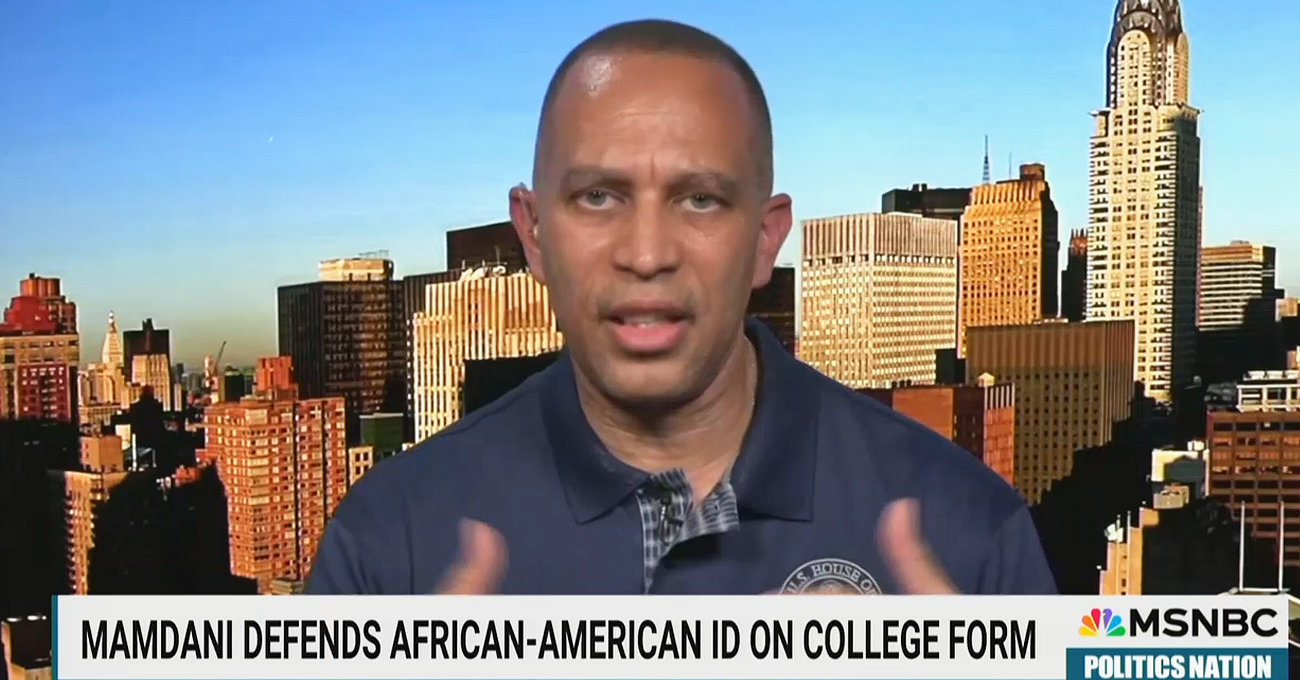Hakeem Jeffries Avoids Direct Question on Zohran Mamdani’s Identity Claims During MSNBC Interview
During a recent appearance on MSNBC, Hakeem Jeffries, the New York Democrat and House Minority Leader, chose not to directly address a pressing issue regarding the Democratic nominee in the New York City mayoral race. The conversation took place on PoliticsNation with host Al Sharpton, where the focus shifted to Zohran Mamdani, the self-described democratic socialist who secured the party nomination by defeating former Governor Andrew Cuomo.
Jeffries had previously spoken about another controversy involving Mamdani—specifically, comments made about Israel and Palestine, which he deemed “unacceptable.” However, during this particular interview, he avoided answering a direct question about Mamdani’s identity claims on his college application, instead steering the discussion toward broader political issues.
The controversy stems from revelations that Mamdani, born in Uganda to Indian parents, identified himself as “Black or African American” and “Asian” on his Columbia University application in 2009. A New York Times article detailed these findings, citing information obtained through hacked data. According to the report, Mamdani explained that his choices were an attempt to reflect his complex background, rather than to gain an advantage in the admissions process.
This issue gained renewed attention after a video surfaced from April of this year, where Mamdani was asked by a performance artist known as “Crackhead Barney” if he would claim the African-American status like Elon Musk. Mamdani responded that he would not, stating, “I’m proud to be Ugandan, but I think that is misleading.”
New York City Mayor Eric Adams, who is African-American, criticized Mamdani for what he described as an insult to students who earned their places in college through legitimate means. In a statement, Adams emphasized that the African-American identity is rooted in history, struggle, and lived experience, and that exploiting it for personal gain is offensive.
Andrew Cuomo’s team also weighed in, with spokesman Rich Azzopardi suggesting that the issue should be thoroughly investigated, noting that if true, it could represent fraud and potentially signal deeper problems.
Sharpton brought up the topic during the interview, framing it as an attack by Mayor Adams and asking Jeffries for his perspective. He highlighted that Mamdani has checked multiple boxes to represent his diverse background and questioned whether this was a real issue.
Rather than addressing the substance of the controversy, Jeffries redirected the conversation to broader concerns facing New York City. He focused on affordability and the impact of gentrification on working-class communities, emphasizing the need for a concrete plan to ensure housing stability for residents.
Despite the lack of direct response, the discussion underscored the growing scrutiny around Mamdani’s background and the implications for his candidacy. As the race for mayor continues, questions surrounding identity, representation, and authenticity are likely to remain central to the debate.
The incident also raises broader questions about how candidates navigate their identities in a politically charged environment, particularly when those identities intersect with historical and social narratives. For now, the focus remains on the challenges facing New York City and the need for solutions that address the needs of its diverse population.







